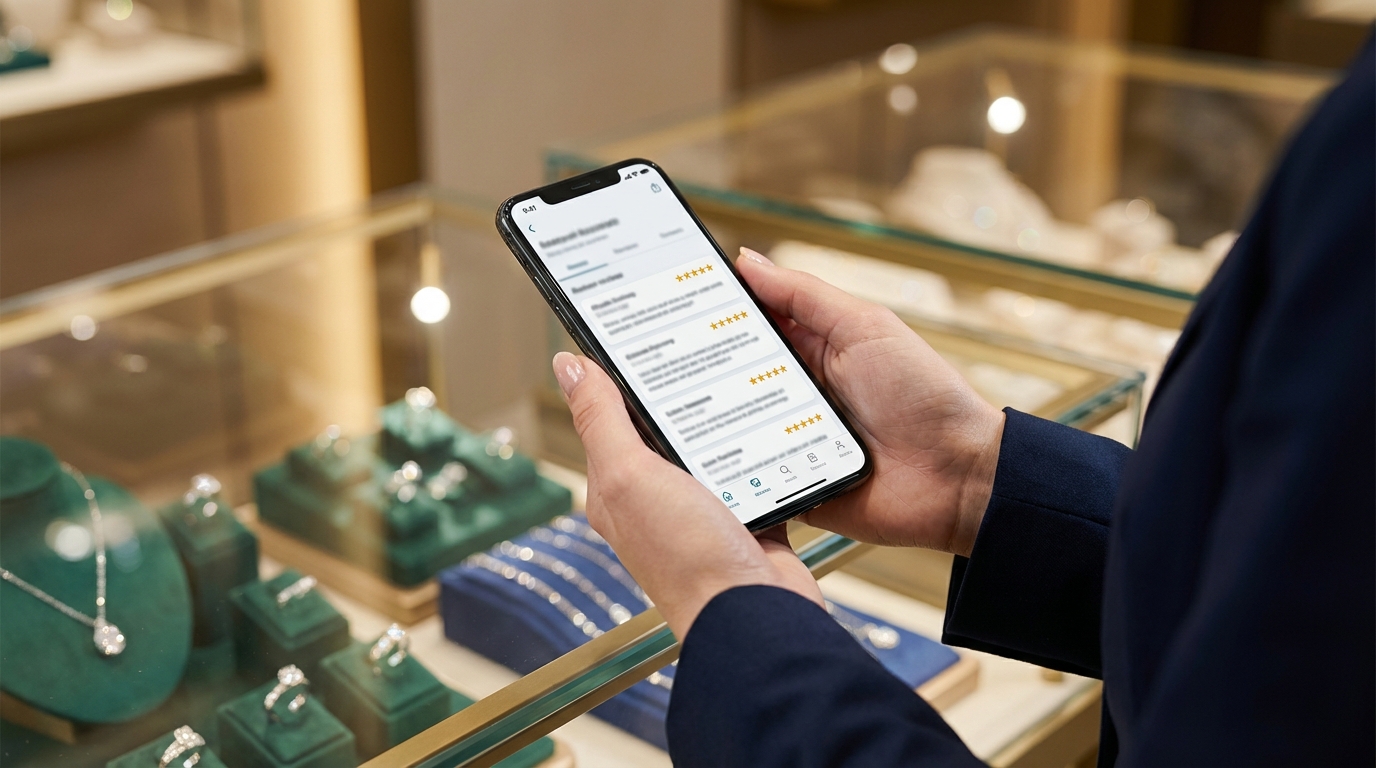If you own or manage a luxury retail store, particularly a jewelry store, you already know that your sales associates are the heartbeat of your business. They're the ones creating those magical moments when customers decide to invest in a piece that will mark life's most meaningful occasions. But here's the million-dollar question that keeps many store owners up at night: How do you accurately measure whether your team is performing at their best?
Many owners and managers admit they're tracking sales numbers in spreadsheets, relying on gut feelings about who their star players are, or worse, not measuring individual performance at all because it feels too complicated or time-consuming.
The truth is, without proper performance measurement tools, you're essentially flying blind. You might have a vague sense that Sarah is your top seller or that Michael needs coaching, but you lack the concrete data to make informed decisions about training, incentives, or staffing. And in today's competitive luxury retail environment, that's a costly gap.
Let's dive into what makes a truly effective tool for analyzing sales associate performance in high-end retail, and how the right solution can transform your business from the inside out.
The unique challenge of luxury retail performance management
Before we jump into tools and solutions, it's important to understand why measuring performance in luxury retail, especially jewelry, is fundamentally different from general retail.
In a typical retail environment, you might focus heavily on transaction volume: how many items did an associate sell today? But in luxury retail, particularly with high-ticket items like engagement rings or estate jewelry, the metrics that matter tell a different story entirely.
Quality trumps quantity
Your top performer might close only three sales in a week, but if those sales total $50,000 and result in customers who become lifelong clients, that's infinitely more valuable than someone who rang up twenty $200 transactions with customers who never return. Focusing on metrics like customer lifetime value can tell a clearer picture of who your top buyers are, and which of your associates are bringing them in.
Relationship-building is currency
The best luxury retail associates don't just complete transactions. They cultivate relationships that span years, even decades. They remember anniversaries, reach out with personalized recommendations, and create experiences that keep customers coming back.
The buying cycle is long and complex
Unlike purchasing everyday apparel, buying luxury jewelry often involves multiple store visits, extensive research, emotional decision-making, and sometimes coordinating with partners or family members. This is especially true for the bridal sales cycle. This means traditional attribution models fall short.
Given these nuances, the tool you choose needs to go far beyond basic POS reporting. It needs to capture the full picture of what makes a luxury retail associate truly excellent.
Six things to look for in a sales performance analysis tool
1. Comprehensive data integration
The foundation of any good performance tool is its ability to pull data from multiple sources and present it in one unified view. Your ideal solution should integrate seamlessly with your point-of-sale system, customer database, and communication channels.
Why does this matter? Because when data lives in silos, you miss critical connections. Maybe an associate didn't close a sale today, but they sent three thoughtful follow-up messages to clients who've been considering purchases. Or perhaps they spent an hour consulting with a customer who ultimately bought online. Without integrated data, these valuable activities become invisible.
2. Individual and team performance metrics
A sophisticated tool should track both quantitative and qualitative metrics at both the individual and team levels. On the quantitative side, look for tracking of:
- Average sale value: In luxury retail, this metric is gold. It reveals which associates are skilled at presenting higher-value pieces and successfully upselling complementary items.
- Conversion rate: What percentage of customers who work with this associate make a purchase? This indicates selling effectiveness and customer rapport.
- Attributed sales: Not just the transactions they personally rang up, but all sales that can be attributed to their influence—including follow-up messages, appointments they scheduled, and referrals they generated.
- Repeat customer rate: This is crucial for luxury retail. Associates who build lasting relationships will have customers who come back specifically to work with them.
- Units per transaction: Are your associates suggesting complementary pieces or successfully offering add-ons like warranty programs or cleaning services?
On the qualitative side, consider tools that help measure:
- Customer satisfaction scores and review: Through post-purchase surveys or feedback mechanisms like Google reviews
- Client communication frequency and quality: How often are they reaching out to clients with personalized messages?
- Product knowledge: Some tools integrate training completion or product quiz scores
- Teamwork and collaboration: Peer feedback or notes on how associates support one another
3. AI-powered insights and recommendations
Here's where modern technology really shines. The best performance tools don't just show you numbers, but they also help you understand what those numbers mean and what to do about them.
AI-powered features can identify patterns that would take hours to spot manually. For instance, the system might notice that one associate's conversion rate drops significantly on busy Saturdays but excels on quieter weekday mornings. With that insight, you can adjust scheduling to play to their strengths.
Even more powerful are tools that provide actionable recommendations. Imagine your system automatically identifying that a particular associate hasn't followed up with a high-value lead in five days and prompting them with a suggested message. Or recognizing that an associate's average sale value has decreased and recommending specific training modules on consultative selling techniques.
4. Automated follow-up and client engagement tracking
In luxury retail, the fortune is in the follow-up. The difference between a one-time buyer and a lifelong client often comes down to those personalized touches: birthday messages, "thinking of you" texts featuring pieces that match their style, or anniversary reminders.
A truly valuable performance tool tracks these engagement activities and includes them in performance metrics. It should make it ridiculously easy for associates to stay in touch with their book of clients and give managers visibility into who's actively nurturing relationships versus who's letting valuable connections go cold.
5. Real-time analytics and historical comparisons
"How am I doing today?" is important, but "How am I trending over time?" is transformational.
Your ideal tool should offer real-time dashboards that show current performance, essential for daily coaching and motivation, alongside historical data that reveals trends over weeks, months, and years. This helps you distinguish between temporary slumps and systemic issues requiring intervention.
It's also incredibly useful for identifying seasonal patterns, understanding the impact of promotions or events, and making data-driven decisions about inventory and staffing.
6. Mobile accessibility
Your sales associates aren't chained to a back-office computer or cash register. They're on the floor, at trade shows, and always on the move. A performance tool that's only accessible from one desktop terminal is going to create bottlenecks and limit its usefulness.
Look for solutions with robust mobile apps that allow associates to check their metrics, log activities, communicate with clients, and access customer information from anywhere. This empowers them to take ownership of their performance and stay connected even when they're away from the register, or even the store.
Beyond the numbers: Building a performance-oriented culture
Here's something crucial that often gets overlooked in discussions about performance tools: the technology is only as valuable as the culture you build around it.
The most successful luxury retailers use performance data not as a "gotcha" mechanism or purely competitive ranking system, but as a foundation for coaching, development, and celebration. When associates understand that the metrics exist to help them grow and succeed, not to catch them failing, they engage with the system differently and you’re more likely to get their buy-in.
Regular performance reviews become collaborative discussions about strengths, opportunities, and professional development rather than uncomfortable confrontations. Associates can see their own progress over time, which is incredibly motivating. And managers can identify coaching opportunities early, before minor issues become major problems.
The best tools facilitate this cultural shift by making data transparent and accessible, presenting information in ways that feel supportive rather than punitive, and building in features that celebrate wins and milestones.
How Clientbook transforms sales associate performance management
Speaking of tools that get it right, this is where Clientbook really shines for jewelry retailers and other luxury goods stores. Clientbook was built specifically for the unique needs of luxury retail, with a deep understanding of how high-end clienteling actually works.
The platform's capabilities in sales associate performance measurement are comprehensive yet intuitive. Store owners get complete visibility into individual and team performance through customizable dashboards that track everything from attributed sales and conversion rates to client communication frequency and appointment completion rates.
What sets Clientbook apart is how it connects performance metrics directly to the actions that drive them. Associates don't just see that their average sale value is down, but they get AI-powered recommendations for specific clients to reach out to, with suggested messages that match each client's preferences and purchase history. They can see their client engagement score and receive prompts to follow up with customers they haven't contacted recently.
For managers, Clientbook provides the insights needed to coach effectively. You can quickly identify which associates are building strong client relationships versus those who might need mentoring in clienteling skills. You can spot training opportunities, recognize excellence, and make data-driven decisions about incentives and scheduling.
The platform also makes it simple for associates to take ownership of their performance. With mobile access, they can check their metrics anytime, update client notes on the floor, send personalized messages between customers, and maintain their client book even during downtime. This creates a sense of accountability and empowerment that elevates the entire team's performance.
And because Clientbook integrates seamlessly with your existing systems while adding layers of intelligence through AI, you're not replacing your entire tech stack… you're supercharging it.
The bottom line
In luxury retail, your sales associates are simultaneously your greatest asset and your most significant investment. Without effective tools to measure and understand their performance, you're making crucial business decisions in the dark.
The right performance analysis tool doesn't just give you numbers. It gives you insights, enables coaching, empowers your team, and ultimately drives better business outcomes. It helps you identify hidden strengths, address weaknesses before they become problems, and build a culture where excellence is both recognized and rewarded.
And in an industry where relationships, expertise, and personalized service define success, that knowledge truly is power. If you’re ready to see how Clientbook can give you the visibility you need into your sales associates’ performance, book a demo today.





